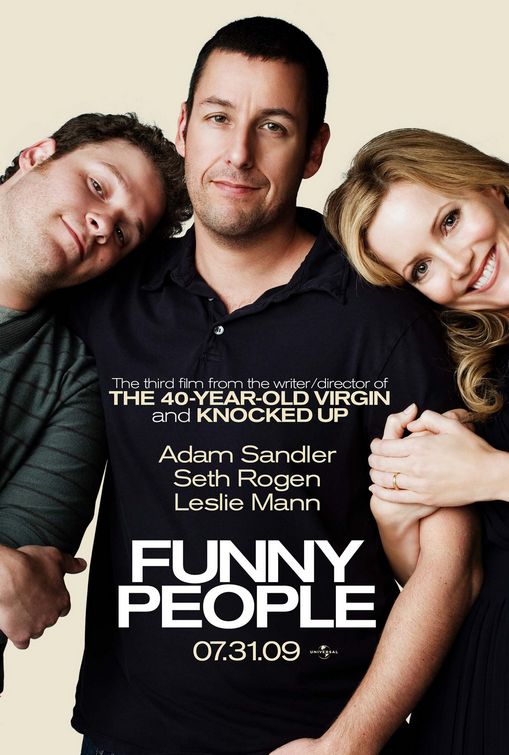 The title is a lie. This is not a review of Knocked Up.
The title is a lie. This is not a review of Knocked Up.
There's a reason for the lie, of course, and that is that when I started to sit down and write a review of Knocked Up and why I liked it so much, I realized that the reasons I liked it had less to do with the movie and more to do with the process that took place that before the movie, the series of events that brought the movie to the screen. I realized that I like this movie in kind of the same way you would like watching one of your friends win a marathon, or your kid win a geography bee. It's about being proud of something, of following something from its struggling early beginnings to its greatest victory. It's about being a part of that world. So, this is a review of that world. This is a review of Judd Apatow and Seth Rogen, and everything they created.
Eight years ago, "Freaks and Geeks," Paul Feig and Apatow's high school misfits drama, was released upon an unsuspecting NBC audience, who for the most part rejected it out of hand. It was an hour-long drama that was equal parts comedy and youthful angst in the most compassionate, honest way possible. A huge number of the storylines were ripped from the personal embarrassments of the writing team's high school years. It was a TV show about what high school was really like, where everyone looked like people you actually knew in high school, everyone was as uncomfortable and emotional as they really were - and it was always, always extremely funny. Five or six years later, shows like it would start popping up on television, but at the time nothing like it had ever been done. NBC never really knew what it had, never knew how to promote it, yanked it around for a season, pulling it on and off the air, and finally canceled it before the season ended. It was a knife to the heart for Apatow, he never forgot it.
Two years later, realizing he'd gotten all sorts of talented actors involved in the acting business who were now getting no work, he launched "Undeclared," a half-hour comedy in the same style about a bunch of slacker college students who spend most of their time hanging around the dorm and trying to entertain themselves - basically, a half-hour comedy about real college students. He brought back Seth Rogen, he fought tooth and nail and found a way to bring back Jason Segel, he ended up bringing back six or seven more actors from "Freaks and Geeks" before the show was pulled, because of course it was canceled before the first season finished. Virtually everything Apatow did ended up being canceled in those days: he had a mess of pilots under his belt that had never been picked up, and his attempts to launch the careers of the actors and actresses he picked were usually laughed at.
Naturally, those careers ended up taking off anyway - James Franco, David Krumholtz, Tom Welling, Jenna Fisher, Linda Cardellini, Charlie Hunnam, Monica Keena - because all of those actors were just as talented as he said they were. That was what was so frustrating to Apatow about his career; everything he touched was pulled away from him, but at the end of the day he was always right. The actors he discovered always turned out to be gems, everything he made would garner oceans of critical acclaim and loyal fans. But the audience, that giant audience that has networks wining and dining you and begging you to stay, that audience was never quite there. Mainstream success never arrived, and Apatow left the television industry and went back to movies, and it seemed hardly anyone noticed he was gone. Maybe nobody did.
Eventually, though, "Freaks and Geeks" and "Undeclared" came out on DVD. And word spread around, people began to follow the stories from beginning to end, and Apatow began to gather a larger contingent. But it wasn't just seeing the shows that brought him support, it was the world that he offered on these DVDs. Every single episode had commentary, sometimes more than one. But rather than just a commentary from the show's creator, or from the executive producers, up to seven or eight people involved would get together to contribute the track: half a dozen actors, sometimes the director or the writer would join, and often Apatow himself would sit in to guide the commentary. Rather than spend the time back-patting or breaking down the elements of the story, the commentary tracks were about telling old jokes and bringing up forgotten stories. And there was an honesty to them - during one, Jon Kasdan (the writer of the episode) and Apatow talked about how Kasdan had quit the business after the show was canceled, sending Apatow a letter that basically said "you broke me." The fact that there were able to get together a few years later and discuss the episode was a testament to Apatow's ability to admit mistakes and move on.
It's that honesty that makes Apatow and his projects so appealing. Apatow never pretended that he was making great art, he never gave interviews that maligned people for not appreciating his genius, he never claimed to be a genius. In the world of Hollywood producing, that's a rare feat: everything made is important and made by people of exceptional, untouchable talent, nothing is made by someone who just likes making TV shows that are funny. Apatow never pretended he wasn't working hard, he was clearly putting his own lifeblood into everything he made, you could feel it just hearing him talk about it. In interviews years later, he talked about how he managed to put himself in the hospital through the stress, he estimates he might've taken ten, twenty years off his life in those more stressful times. But by then he was out of the industry and producing movies again, and nothing had been heard from him in a few years.
In the meantime, as far as I can tell, Rogen did nothing. Rogen states that the lazy, unfocused life that he and his apartment mates live in Knocked Up is a fairly close approximation to his actual life for a while. Pretty much the only person who hired him as an actor was Apatow, and so Rogen kept standing by, waiting. Eventually, he ended co-writing a script with Apatow called "The 40-Year Old Virgin." Rogen pushed to have it be as profane as possible, the argument if you're going to have someone as sweet and awkward and honest-looking as Steve Carell as your lead, doesn't it make it that much funnier to have him be surrounded by completely opposite characters? He turned out to be more right than he knew.
And of course, The 40-Year Old Virgin ended up being a smash success, but what was important about it was that it wasn't that was the first time Apatow had something hit big but rather that the thing that hit big wasn't any different from the things he'd made before. It was that same loose, improvisational style, that blend of comedy and honesty, all those things that had been the trademark of everything that Apatow had done that had failed. It was a vindication that he'd been right all along.
Knocked Up is an extension of that success, in fact the culmination of it. It features only actors who've been in Apatow productions before, and the four actors playing Rogen's best friends are his actual best friends, three of whom played his friends all the way back on "Undeclared." Even the day players are roles filled by people connected with Apatow in some way - actors from "The Office," or Loudon Wainwright III, who played the father on "Undeclared" and contributed the soundtrack to Knocked Up. The world created is the world they built from the ground up, filled only with people they discovered and trained. It's like these films operate in their own universe, their own tiny Golden-Era Hollywood filled with actors who only appear on screen when summoned by Apatow. And you got to see it all come together right before your eyes.
My brother didn't like the film, found it just coarse and unfunny, full of drug jokes and constant profanity, and I see his point, because it is full of drug jokes and constant profanity and it's easy to get turned off by it all those things, I know a lot of people who were. But watching this movie meant I got to watch the moment when all the awkward young actors I've followed finally truly found their feet. And I don't mean to say - I can't emphasize this strongly enough - that it wasn't funny but I found it funny because I've gotten attached to these actors. I mean to say that I've gotten so in tune with how these movies feel and flow and how the jokes land that it just made it that much funnier, and I got to see all the sweetness and camaraderie that's apparent, not in spite of, but actually through the dirty jokes and drug humor. It was everything I'd been waiting for. And that's saying something.
Four stars out of Five.

 #21 Funny People
#21 Funny People 

